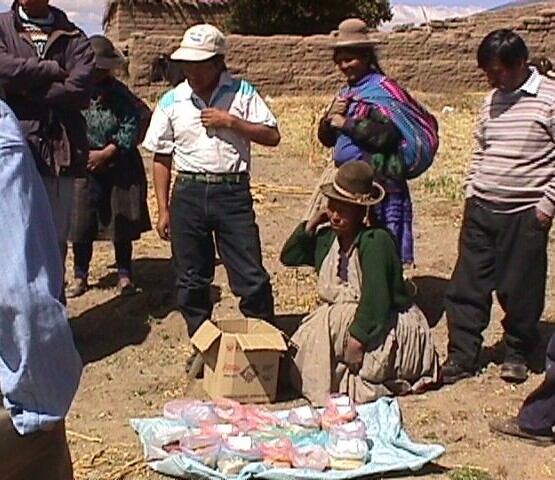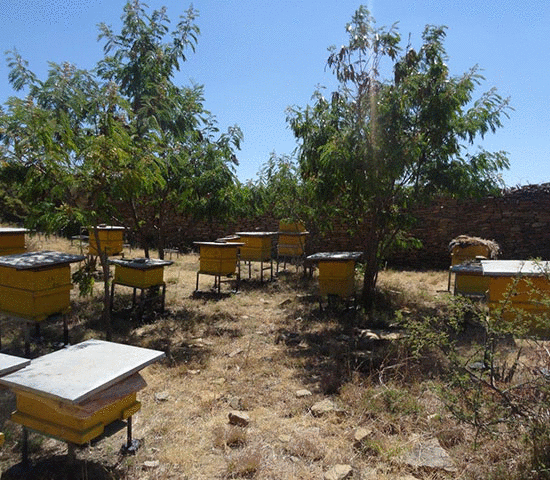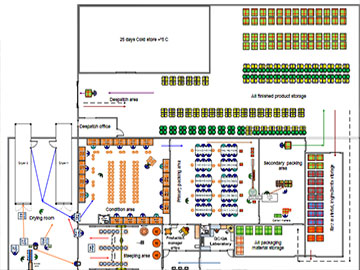1- Developing industries by developing niche products into staples.
Converted a near extinct mutant variety of quinoa to an international sensation. In Peru we “discovered” a near extinct variety of quinoa and paid for the buyer to visit Peru where he too saw the opportunity in developing a new product and provided a contract to the grower association to produce product with pre-payment for product that existed in small quantities yet to be multiplied to commercial viability.
2- Modernizing an industry by using market forces to move bee hunters to beekeepers
In Ethiopia and later in Kenya and Zambia 20/20DC and our African Bee Challenge 2020 (ABC 2020) we supported remote villages to adapt to modern beekeeping with the demand of the market being the force which brought production to adopt modern hives and practices.
3- Using market demand to develop a product that locals viewed as having “no market.
With buyers engaged the process 20/20DC helped nomad Mongolian herding families to produce Japanese Agricultural Standards (JAS) blueberry jam in their yurts.
4- Helping growers produce what is sold rather than selling what they traditionally produce.
In Paraguay we helped producers switch the variety of sesame they produced to meet market demands in Japan resulting in increase of sales from around 14,000 MT to 34,000 MT within 5 years.
5- Resident Entrepreneurs in all major markets we are more than a fly-in-fly out consultant team.
We have Team Members in around 12 countries, reflecting all major global markets for food products. These teams on the ground provide a local perspective with a global view.
6- Experience in agriculture and international trade that can’t be learned without being lived.
Our 20/20DC Team Members have been there and done that in international agriculture and food trade. Our experience is enhanced by academia but dependent upon experience.
7- We are driven by purchase orders, not reports.
Our success comes when the businesses we support succeed as a result of the visible hand of support that we provide in overcoming business and cultural hurdles.
8- We know the reality of international trade.
Often challenged by development professionals whose objectives are often unobtainable in the short-term or directed by KPI’s that don’t address underlying issues we use our experience to develop best practices.
1- Identifying niche opportunities
We support companies moving from producing a commodity to producing a niche item where market demand exists, and brand and consumer loyalty can be developed.
2- Supporting value-added product production
To capitalize upon competitive and comparative advantages we work with producers to add value through appropriate technology to be the competitive supplier of a value-added product.
3- It is a demand chain not a supply chain.
Nothing sells without demand. Therefore we assess the resources of a company and then apply the factors of demand to identify the product that they can best produce to capitalize upon their strengths.
4- A proven record of identifying existing products that are under sold.
From wild blueberries in Mongolia to the Tajiki Roll ™ in Tajikistan we have identified products that locals overlook to develop strong international demand.
1- In country team members in more than a dozen countries.
With RE’s in the Americas, Europe, MENA, Europe and Asia the 20/20DC team has the markets covered with in country experts with networks of buyers and support organizations.
2- Working as a team around the world.
Every assignment that 20/20DC engages in is supported by a team which supports, challenges, reviews and refines other Team Members efforts with synergistic results that can only be realized when working with a team that works together and provides open expertise and perspective.
3- Identifying opportunities that can only be found with the Entrepreneurial Eye.
20/20DC Team Members are experienced entrepreneurs who possess all the strengths and weaknesses of an entrepreneur that has experienced success and failures. We utilize these experiences to help our clients build upon tehri own strengths and avoid failures when possible.
4- Varied expertise of our Resident Entrepreneurs provides strength.
Our comprehensive team covers the agricultural spectrum including individuals with expertise in entrepreneurship (concept developers), development and agricultural economics (quantifiers), technical experts (food processing engineers and scientists) and marketing experts with diverse global experience. Working as a team, 20/20DC capitalizes upon the proficiencies of individuals with different disciplines which allow us to have a panoramic view of the challenge while still having the know-how on the ground to improve production and teach these skills to a diverse audience. This results in successful businesses utilizing existing and enhanced resources.
1- Expertise across the food demand chain
Starting at harvesting the 20/20DC team provides our clients with an integrated program to move from harvest to shelf.
2- From Post-harvest experts to consumption.
Harvesting and handling a product properly depends upon the market, therefore we work with market demand at every step of the processing and distribution chain.
3- Demand without supplier is an opportunity.
Identifying the demand to develop the right product requires understanding the consumer demand. Our Resident Entrepreneurs take their local expertise back to the farm and work with our food process engineers to utilize appropriate technology to produce the product that meets market demands.
4- A love for agriculture and an understanding of its impact on people.
Every 20/20DC Team Member understands how agriculture and food production and distribution efficiencies control the destiny of the world.
1- Produce the right product.
working with our team we work with the producer to produce, package and distribute the right product for the market to maximize their net returns.
2- Utilize appropriate technology.
What is appropriate technology for one producer may not be “appropriate” for another so our team tailors their programs to blend producer resources with market demand.
3- Processing to the global sanitation standards.
The Coronavirus Covid-19 has proven to the world the importance of food sanitation beyond traditional standards. The 20/20DC Team includes PhD’s and experienced food process engineers to ensure that sanitation standards are met or exceeded.
4- Production efficiencies and minimization of waste.
The 20/20DC Team has developed many processes that improve efficiencies and minizine waste.
Japan - Resident Entrepreneur - decades of experience working in Japan with both the private sector and development work. Primary development products succeeded in Japan - Wild Mongolian Blueberries (link to story), Sacha Inchi from Peru (link to story) and organic olive oil.
Bangladesh – work with USAID agricultural development work. Training presented in CHARM DANCE to producers and exporters. Developed pet toy industry for jute pet toys.
Pakistan worked with USAID FIRMS project (Chemonics) to develop mango industry. Worked with fresh and dried mangos. Designed mango processing facilities to move industry away from waste of fresh product by developing additional products. Worked with fresh mangos by identifying market in Europe and worked with first shipments of fresh to Europe.
Tajikistan – Extensive work with USAID Central Asia Trade and Jobs (CTJ – DAI) and European Bank of Reconstruction and Development projects (EBRD). Working extensively with dried fruit companies in Isfara including work for standards, sanitation, packaging and markets. Developed business in USA, Middle East and Europe. Developing new products to move producers from commodity producers to value added product and competitive advantage products. Worked with box manufacturer to move themselves away from “box” to package company to supply local Tajikistan producers with wider range of boxes.
Working with southern Tajikistan to improve quality and overall company knowledge and management. CHARM DANCE training in multiple locations for EBRD and USAID.
Currently Team Member of E4 consortium with Palladium for continued support in Tajikistan and the region.
Uzbekistan – Partner with DAI in Uzbekistan Ag Value Chain projects (year) to improve agricultural marketing opportunities. Supported project with market and education efforts in Latvia, Lithuania, Poland, Holland, Germany, UAE, India, Japan and Korea. CHARM DANCE training included in efforts.
Developed multiple buyer visits to fruit packing companies from diverse markets including Hong Kong, India, Europe and the Middle East.
Uzbekistan projects included work with DAI CTJ project and ongoing E4 project with Palladium.
Kazakhstan – work begin in Kazakhstan with CHARM DANCE training at the Central Asia Trade Forum on behalf of USAID funded project run by Chemonics (CAR REC). Followed up with train the trainer work for KAZNEX the Kazakhstan export promotion agency. Additional training was done in packaging and marketing for KAZNEX and USAID. CHARM DANCE training was completed for EBRD export promotion program.
Kyrgyzstan – work with CHARM DANCE training and export training for EBRD. Also worked with EBRD and the textile manufacturing industry with one on one consulting with leading wool yarn and fashion industry.
Azerbaijan – including work in Nakhchivan worked with International Trade Center (ITC) for CHARM DANCE training and export preparation and tradeshow training. Supported at European based tradeshows with company assessment, export market plans and strategy.
Georgia – worked through 3 different USAID funded projects (Chemonics, ACDI\VOCA, Deloitte) to develop the wine industry in Georgia. Typically, USAID does not work with wine, however, after Russia banned Georgian wine exports. In Georgia wine exports are the major driver of trade and culture. Therefore, it was essential that Georgia recover markets and diversify the industry. Included with CHARM DANCE training the 20/20DC efforts included brining in 100 bottles of wine from US retailers to educate the suppliers with the USA market. Other activities including bringing five Masters of Wine and wine influences to develop press for Georgian wine. We also brought a supply chain of importer, distributor and retailer (Whole Foods Market) to conclude purchases and retail sales of Georgian wine at leading Whole Food Markets in Washington state and Washington DC area Whole Food markets. Successful in increasing Georgian wine sales to mainstream US consumers.
Moldova – worked with USAID funded project operated by Chemonics to identify and develop opportunities for Moldovan wine. Efforts synergized with Georgian efforts including sales of Moldovan wine to Georgia for production of sparkling wine – taking advantage of competitive and comparative advantages of each country.
Ukraine – extensive work with International Trade Center (ITC) to develop produce and other
horticulture exports from southern Ukraine. Efforts included multiple versions of CHARM DANCE training. Efforts also included work in Kiev with on nut exports and export training. Efforts included support for PolAgra tradeshow in Poland, Fruit Logistica and ANUGA in Germany and Gulfood in Dubai.
Romania – worked with USAID funded project to identify and develop marketing plan for the wood industry in Romania.
Serbia – worked with Booz Allen Hamilton on USAID funded project to develop textile, food and wood industry. Did market assessments and business plan development for three sectors.
Palestine – work in Palestine includes work with USAID (DAI) and the International Trade Center (ITC). Products supported included dates, herbs, olive oil, strawberries and sauces. Efforts included complete analysis of the USA market for Palestinian products.
Lebanon – working with USAID 20/20DC supported the LIVCD project in linking suppliers with US buyers. Sales resulting from this effort has resulted in millions of USD in sales of value-added food products. Training provided to the Lebanese companies included a version of CHARM DANCE which focused on the USA market and how Lebanese companies could enter the market.
Jordan - worked with USAID project briefly to write plan for Private Public Partnership (PPP) for establishing sustainable business led tourism which includes government support and private sector investment and business.
Egypt – Currently working with USAID ERAS - Egypt Rural Agribusiness Strengthening project managed by ABT Associates. This 5-year project has 20/20DC providing training (CHARM DANCE and others), market linkages, product and business development plans. Efforts support exporters to visit Spain (Fruit Attraction), Germany (Fruit Logistica) and the USA for NYC Fancy Food Show. Products supported include onions, pomegranates, herbs and other horticultural products. Multiple 20/20DC team members are engaged in extended development of Egyptian exports. 20/20DC is represented in Egypt with a Resident Entrepreneur who supports 20/20DC efforts in the MENA region.
Tunisia – working with the Chemonics lead USAID JOBS project to develop exports of Tunisian products including olive oil, dates, value added food products and seafood. This is a multi-year project with multiple 20/20DC teams engaged. Training has included CHARM DANCE and efforts specific to the commodities and products available for export.
Ethiopia – working with ACDI\VOCA on the AGP-AMDe project to support market linkages and market development for honey, sesame seed, coffee, and chickpeas. Multiple successful market linkages were achieved with this project for the Ethiopian beneficiaries. The greatest success tied with this project is the Private Public Partnership (PPP) between a leading global honey trader (Italian/Argentinian - Parodi) and local Ethiopian cooperative honey producers. Under this agreement Parodi supplied equipment and the market for Ethiopian honey and the cooperative and USAID provided production, structure and supply. This is a prime example of USAID engagement with the private sector. Lessons learned include positive and negative examples. Training in Ethiopia included CHARM DANCE, marketing, tradeshow participation etc. Efforts included participation at Gulfood and ANUGA.
Kenya – Expanding upon success in Ethiopia on Honey the 20/20DC team supported efforts in Kenya to expand their markets. Much of this work was done through the Mercy Corp project for YES, Youth Can USAID funded project to support youth involvement in the economy. The plan focused on the opportunities of honey to provide opportunities for youth and women to be productive in the cash economy. The challenge was to move the Kenyan honey industry from honey hunters to beekeepers with modern hives and apiculture techniques.
Zambia – working with two USAID funded projects and the International Trade Center (ITC) in developing the Zambian honey industry 20/20DC was able to integrate the private sector with Zambian industry and governmental programs supporting Zambian honey. This included expanding the Parodi role in Zambia, based upon successes in Ethiopia, and bring in new buyers from Europe and the USA to support Zambian honey exports. By creating global demand, the efforts brought about change as Zambian producers worked to meet global standards for product, quality and sanitation.
Nigeria – 20/20DC involvement in Nigeria includes CHARM DANCE training for a Nathan run USAID funded project which included development of a development strategy for sesame seed. In addition to this effort voluntary support is provided to the Global Shea Alliance (GSA) which includes activities in Nigeria.
Ghana – efforts in Ghana include training women entrepreneurs in the principles of CHARM DANCE engaged in the Global Shea Alliance. 20/20DC was responsible for establishing the first GSA conference outside of West Africa with an event in NYC in 2013. This effort continues through sustained efforts of the GSA with 20/20DC providing only accounting and administrative efforts to support the Alliance.
Mali – efforts with Mali have been focused on exports to the USA market for mangos and related products and natural gums. Support included one-on-one meetings with importers prior to and at the NYC Fancy Food Show and the Institute of Food Technology show. Efforts included tradeshow training and CHARM DANCE training via webinar.
Tanzania- On behalf of the USDA FDA 20/20DC completed an industry review of the cashew industry. Despite the mission of the funding of the study the 20/20DC team determined that a local processing facilities for cashews in Tanzania was not economically feasible due to several factors including limited processing of a few months a year versus competing processing countries (primarily India and Vietnam) that process 12 months of the year and therefore amortize their factory over 3x’s the productive months. This is a prime example of how objectives of development strategy are not justified by economic factors and when these projects are executed result in failures and unsustainable ventures which are able to succeed only when subsidies are in place.
Mauritius – Funded by Enterprise Mauritius the 20/20DC team did assessments of several current and potential exports of Mauritius food products. This effort included assessment of product, process and standards.
Europe – while no ongoing development work is done in Europe the 20/20DC team is active across Europe with multiple Resident Entrepreneurs in Europe to support the efforts of 20/20DC projects in the region.
Caribbean – 20/20DC efforts in the Caribbean include work with USAID and the International Trade
Center (ITC) countries and efforts include:
Barbados – feasibility study for Shared Use Facilities (SUF) to support the hot sauce industry to meet global standards and be competitive on a quality and standards perspective. Efforts included global market assessment, structure of a Shared Use Facilities (SUF) and business plan development for an SUF.
Antigua, Barbados, Dominica – efforts included business integration and strategic project design to increase economic sustainability. Project funded by USAID, operated by Chemonics as the Caribbean Open Trade Support (COTS) project.
Grenada – a review of the Grenada produce industry with a focus on exports of soursop to the USA. Efforts included assessment, sanitation training and certification, government agency strategy development and recommendations. Project funded by International Trade Center (ITC).
Guyana – CHARM DANCE was originally developed in Guyana for USAID funded Guyana Economic Opportunity (GEO) project. 20/20DC was engaged in 2003 and 2004 in training the trainer on the CHARM DANCE efforts and in 2016 the original trained trainers came back to 20/20DC for an update of the program that they had been delivering for 12 years!
South America – 20/20DC has Resident Entrepreneurs in Brazil, Argentina, Paraguay and Peru. These individuals have expertise in food production, processing, meat industry, sanitation standards, textiles and apparel, forestry and project management.
Peru – Peru was the first country that 20/20DC was engaged in with multiple successes through our efforts the largest of which was the discovery of red quinoa (Pasankalla). This product was discovered by 20/20DC founder Jim Krigbaum when a local Alti Plano farmer brought mutant seeds to show him the varieties of seed she had discovered on her farm. Seeing the red quinoa Mr. Krigbaum saw an opportunity to introduce a new crop to the global consumers. In the final USAID report by Chemonics states “Consultancies have had less success in identifying new markets. For example, a PRA consultant arranged for the president of Quinoa Corporation to visit Peru in 2001; after visiting the Puno economic corridor, he decided to test the red pasankalla variety of quinoa in the U.S. food service industry and ordered 72 metric tons. Because that variety was close to extinction, it took a number of years for the local processor, El Altiplano SAC, to fill the order, and demand has been sporadic since that time.” This “failure” results in excess of $120 million USD in exports annually breaking $100 million annual exports around 2010. This is a prime example of how agricultural development timelines often exceeds the time frame and expectations of development agencies.
Additional products supported from Peru include Sacha Inchi, a high omega 3 plant from the Andes, with the introduction of Sacha Inchi into Japan and the development of the roasted sacha inchi snack available in Whole Foods and other healthy retailers in North America, varied wood industry opportunities and exports through USAID funded Bosques project.
Bolivia – in addition to the spillover effects of the 20/20DC efforts on quinoa the 20/20DC team was directly involved with USAID efforts to support exports of wood products, crafts and other agricultural products.
Paraguay – everlasting impact of the 20/20DC efforts in Paraguay can be found on the retail shelves and in cupboards around the world. In 2004 the USAID Paraguay Vende project in Paraguay published a report titled “Stevia de Paraguay” to support the natural sweetener indigenous to Paraguay – stevia. This report was the result of a high political level agreement of the USA to support trade with Paraguay. The results of this report, and efforts by the 20/20DC team were instrumental in stimulating the Cargill engagement in getting stevia Generally Regarded as Safe (GRAS) certified. This GRAS certification opened opportunities for stevia to be utilized as a food ingredient versus just a dietary supplement. With this GRAS status and Cargill support major companies like Coca Cola and Quaker took on stevia as a natural sweetener for their products. In 2017 Stevia sales were estimated to be at a global $490 million USD. While 20/20DC can’t claim all of the credit for the success of stevia (as they can with red quinoa) their efforts in the 2004 report were a solid stimulus to the industry.
Other efforts in Paraguay include support of development of the wood molding industry. Paraguay has limited forestry resources; however, an assessment of competitive and comparative advantages identified the fact that Paraguay’s neighbors had an advantage on semi-processed wood products but lacked sufficient labor to move product up the value chain. This labor was available in Paraguay and the 20/20DC team assisted the used Paraguay Vende team in developing a wood molding industry.
Other activities in Paraguay include sesame sed and frozen Cooked Beef.
Colombia – 20/20DC was briefly involved with USAID in Colombia through an assessment of a USAID funded palm heart company. When we received the call from the contractor on the USAID project we were excited about the opportunity as we were informed that the company had thousands of cases of palm hearts but had no market. This provided to be a great example of supply without demand is waste. Through the direction of other consultants’ product of palm hearts was identified as a great opportunity for the area to compete with a value-added product. Unfortunately, the consultant designed, and USAID funded the construction of the factory without consideration for the market. Yes, there is a market for palm hearts, but the project failed to address the market and produced a product that was harvested too late (yes they got a bigger product and more harvest, but it was less edible due to woodiness) and then packed it in a size can that isn’t demanded by the market. From that point forward we have worked hard to ensure that those doing the planning of investment and development do so with market driven demand. It was then that we coined the term – “supply with out demand is waste and demand without supply is opportunity.” It is our objective to help companies find the opportunity and then produce what they can sell rather than work to sell what they produce.
Central America – the 20/20DC team has been engaged in Guatemala, Costa Rica and Nicaragua. Most of this work was focused on coffee market opportunities and working with USAID projects to ensure that product produced is demanded.



































